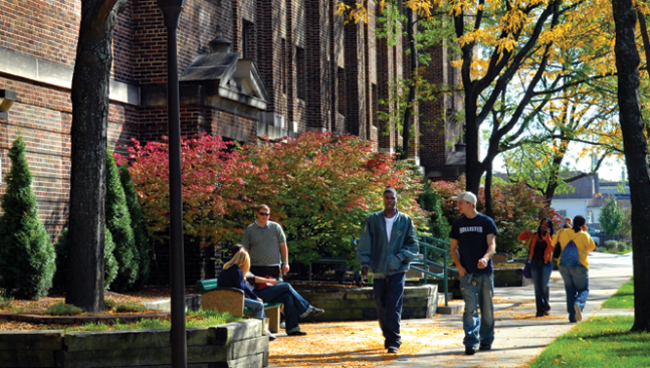You have /5 articles left.
Sign up for a free account or log in.

Milwaukee Area Technical College's West Allis Campus
MATC
At Milwaukee Area Technical College, more than half of the students are from the city of Milwaukee. Most are minorities. And low income. Yet many at the college are concerned their interests aren't -- and can't -- be addressed by a college district board that disenfranchises those communities.
So a coalition of Milwaukee-area community leaders and students and faculty from the college want new legislation to alter the MATC board appointment process to restore the balance of power to align with the college and city's demographics. Some members of the coalition lay the blame at the feet of the local chamber of commerce.
"This is a public institution that should be controlled by the citizens it serves and they want it controlled by one small slice of the business community," said Michael Rosen, an economics instructor at the college and president of the local branch of the American Federation of Teachers, a faculty union. "There have always been major employers on the board, but they wanted control over the board. It's really a corporate takeover."
The MATC board composition wasn't always so controversial. But in 2011 the two-year college was singled out from the other 15 members of the Wisconsin Technical College System by the state's Legislature, which changed the appointment process for the institution. Prior to the change, the nine-member board consisted of one K-12 school district administrator, one elected official, three at-large members, two employers and two employees.
But the Republican-controlled Legislature changed the composition of the board to make it more business heavy. It currently includes:
- Five employers
- Three representing businesses with 15 or more employees
- Two representing businesses with 100 or more employees
- Two of these members must represent manufacturers
- One school district administrator
- One elected official
- Two additional, at-large members
The new rules included additional racial, gender and geographic requirements. At least three members of the board must be women and at least three must be members of minority groups, with two of the three minority members residing within the city of Milwaukee. And seven of the nine members must reside in Milwaukee County.
"The rationale they gave was that MATC was out of touch with the business community, but that was just public relations," Rosen said. "This was a Republican power grab to put MATC under their control."
The appointment committee, which selects the board members, also was changed. Originally the committee included chairs from the K-12 school boards within the MATC district. Now it's composed of the county executive of Milwaukee County and chairpersons from the Milwaukee, Ozaukee and Washington Counties boards of supervisors.
The business chamber, which was a major proponent of the legislative change in 2011, has a different view of the changes.
"They fundamentally misunderstand the law. Nothing changed with geographic or minority representatives. The changes that were made to the composition had to do with increasing business representation so we could have a better, responsive connection between the board and the customers they're serving, who are the employees they will hire," said Steve Baas, senior vice president of governmental affairs and public policy for the Metropolitan Milwaukee Association of Commerce.
"From our perspective it's been a resounding success and the technical college has been on a nice roll this past few years and it's created some innovative new programs like the Milwaukee Promise initiative that will expand access to MATC," Baas said.
Yet a coalition of students, faculty and community members is advocating for legislation that would return the board composition to what it was prior to the 2012 change. They also want the appointment committee to include Milwaukee's mayor, the president of the city council and the president of the Milwaukee board of school directors.
The launch of the new Promise program -- which is expected to bring in even more minority and low-income students -- is why making the board more representative of the student and city population is more important, Rosen said.
Similar to President Obama's free tuition plan for community college students, the MATC Promise will offer last-dollar scholarships to cover tuition for qualified 2016 high school graduates who reside in the college district.
"When we have issues with classrooms being unavailable or issues with transfer credits, we want people on the board who represent us," said Mai McCarthy, an education major in her last year at the college. "I'm Asian, from the city of Milwaukee, 29 years old, mother of two, who grew up poor. How can someone who is rich and white from Ozaukee County have an understanding of my experience or any student attending MATC?"
Part of the issue is that the changes put more power into the hands of Ozaukee and Washington County officials to make the board appointments. Those two counties lie on the edges of the college's district and are demographically different from both the city of Milwaukee and Milwaukee County. The appointment committee doesn't have a representative from the city, even though 56 percent of the MATC district resides within city boundaries. Ozaukee County represents 8 percent of the district and Washington County represents 2.25 percent, yet both have a member on the appointment committee, according to Keith Roberts, a senior research fellow with the Institute for International Studies in Education at the University of Pittsburgh and a former MATC administrator.
Nearly 95 percent of Ozaukee identifies as white and about 5 percent of residents fall below the poverty line, while in Washington County 95 percent identify as white and about 6 percent fall below the federal poverty level, according to the U.S. Census Bureau. Politically, both counties are heavily Republican.
According to the National Center for Education Statistics, 65 percent of full-time MATC students received Pell Grants in 2014 and at least 48 percent identify as a minority, while 42 percent identify as white.
"We are routinely described as the most -- or one of the most -- segregated metro areas in the country," Rosen said, adding that a large majority of African-Americans live within the Milwaukee city limits. "There are no African-American-dominated suburbs and very few African-Americans live in the suburbs. Ozaukee and Washington Counties are overwhelmingly white … they're also some of the most right-wing, conservative, Tea Party Republican-voting counties in the country. The notion of moderate Republican doesn't exist and they've used their control of the Legislature, which they won in 2010, to restructure the governance process of the technical college leading to disenfranchisement of the Milwaukee African-American community."
But Baas argues that the new board composition has become less political because it isn't dominated by special interests.
"Milwaukee County is historically and traditionally very liberal and Democratic, while Ozaukee and Washington Counties are historically more conservative," he said. "But this has really forced ideology out of the process, because they have to work together to compromise."
McCarthy said there haven't been any major negative changes that the board has implemented that she's been able to see as a student, but the gradual disenfranchisement of minorities on the board has her afraid of what they might do in the future.
"It'll strictly be, 'Here's your license, you be a welder and you be a welder and you too,'" she said. "And that's it. You won't have the option to be a teacher, or a nurse, or a scientist or a biologist. Those options should be available and MATC has those options available and we don't want them taken away … it's obvious with businessmen they'll privatize MATC and that's what this is leading to."
The Focus on Business
Fred Royal, president of the Milwaukee branch of the National Association for the Advancement of Colored People and a former board member, said Milwaukee has high levels of poverty, around 23 percent, and one of the smallest minority business ownership rates in the country. That explains why the emphasis on business leaders on the board has led to less representation by Milwaukee minorities, he said.
He's also against the preference on board members being from the manufacturing sector.
"There's been a swing in how much welding is needed in the area. All of the labor market indicators show health care will be the biggest employer and have the highest demand in the next five to 10 years," he said. "Other than health care, there's construction … and that gap isn't being met at this time."
Baas said manufacturing isn't leaving the Rust Belt city anytime soon.
"Milwaukee has the second-largest manufacturing economy in the nation. It's always going to be the key economic sector and driver in the community. Yes, there are other sectors growing -- health care, financial services, food and beverage -- and to their credit, the current board has been responsive to that and to opening other programs," he said. "But to suggest manufacturing will not be the heart of our regional economy and is not something the technical college should be engaged in is ignoring reality."
Instead, the biggest challenge the local economy is facing, he said, is having a skilled workforce for the economy.
But Royal said the emphasis on business leaders can lead to other problems.
"The other thing is when you have folks who are just business minded, they don't think about the social consequences that the student population is dealing with," he said.
Royal said during his time on the board the former members were sensitive to student issues. For example, if a student's financial aid hadn't been processed or if their payments hadn't been received yet, they were more lenient with allowing the student to register for classes.
"And now it's more of a financial decision that the college deregisters them," he said.
The issue isn't about party politics, according to Royal.
"It's the erosion of the democratic process," he said. "We're focusing on us against them and it's really about the flow of resources …. You don't shrink government by privatizing services. You just reduce accountability and make a group of individuals benefactors of those services."








